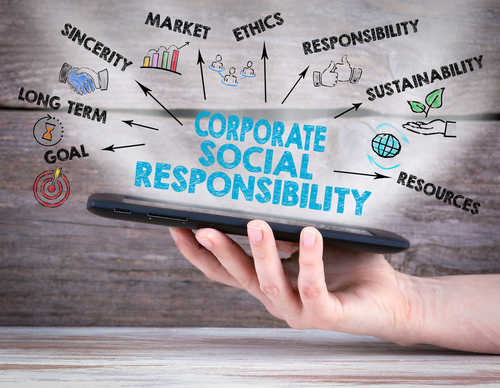Organisations are investing more and more in Corporate Social Responsibility (CSR) with 93% of the world’s largest 250 companies publishing annual CSR reports according to KPMG’s Survey of Corporate Responsibility.
Over 15 billion a year is spent on corporate social responsibility (CSR) activities by UK and US companies as reported in the first EPG research findings report. Source: Financial Times
As a result of the year on year growth of investment in CSR, we’re seeing more companies following the trend and realising the importance of it. You can find examples of companies successfully implementing CSR to engage their employees and customers in this article. But first, let's take a look at the purpose of CSR and define what it actually means.
Defining CSR:
Business news daily defines CSR as “an evolving business practice that incorporates sustainable development into a company's business model. It has a positive impact on social, economic and environmental factors”.
CSR is not necessarily something that has to be followed and is set by official laws. However, there are laws in place to stop businesses from being irresponsible and penalties can be imposed on organisations. Usually corporations take it upon themselves to act on improving their own procedures, so it can benefit the environment, the wellbeing of their employees and communities worldwide.
What is its purpose and why should organisations care?
In today’s business climate, consumers and employees care about the motives of an organisation. CSR is not about companies exploiting community and charitable work to benefit from financial gains. Its real purpose is based on an organisation delivering a promise to consumers to make a change that will positively help the world and local communities.
There are many incentives and benefits behind CSR. First of all, organisations are caring about CSR and investing in it because they committed to making a better, more equal, sustainable world. This altriusm and moral acts of goodwill helps to build a positive brand reputation and can allow organisations to be recognised for their work. It can also help to build customer loyalty and employee engagement if all parties are onboard with the CSR work you are implementing. In doing so, CSR can inspire not only long-term employees. It can also help to attract talented recruits and retain 'new employees' by allowing them to be part of a positive, caring culture and to feel happy about representing an organisation that is philanthropic. CSR in some circumstances can have many other knock-on benefits such as: cost-savings, increased growth or financial performance and global media recognition.
However, It’s important to note that CSR should not be seen as a company campaign to increase revenue as consumers can see clearly through this and it is apparent that CSR is being implemented for immoral reasons. An example of immoral CSR is shown by the Volkswagen scandal in 2015 in which the EPA (Environment Protection Agency) revealed that the Volkswagen Group was being dishonest about the pollution emission measures of its diesel engines. This ended up in sackings for senior leaders in the group, millions of cars being recalled and financial losses all through a failure of not complying to CSR conduct and being irresponsible for the environment. You can read the story in more detail on the BBC news website here and find other examples of CSR done badly and the suggested fixes on this article.
When CSR is done badly it can be harmful to an organisation and have the opposite effect of what CSR is intended to do. The intended effect being brand loyalty and consumer and employee appreciation. Consumers and society will naturally appreciate the actions of a company when CSR is authentic and done for the right reasons. To learn about some examples of successful CSR projects read "How to engage your employees through corporate social responsibility".



.png)
